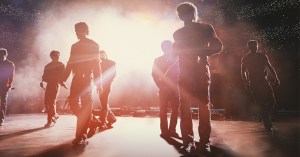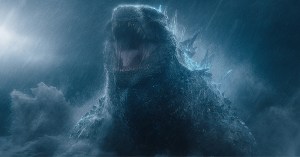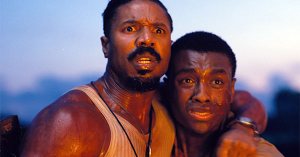Total Recall: Dudes in Drag
With Big Mommas: Like Father, Like Son hitting theaters, we present a brief rundown of cinematic cross-dressers.
After a five-year break, Martin Lawrence is back for another round as the perpetually cross-dressing cop Malcolm “Big Momma” Turner, and this time he’s got company: in Friday’s Big Mommas: Like Father, Like Son, Brandon T. Jackson joins Martin as his equally frock-friendly stepson, Trent “Charmaine Daisy” Pierce. All these fellas running around in wigs and dresses got us thinking about some of the many other films that required their male stars to put on a little makeup, flash a little leg, and bat a few eyelashes. From comedies to dramas, Oscar winners to cult classics, this week’s Total Recall is a total drag!
The Adventures of Priscilla, Queen of the Desert
94%A road trip movie with a decidedly flamboyant twist, The Adventures of Priscilla, Queen of the Desert follows the trail of three drag queens (played by Guy Pearce, Hugo Weaving, and Terence Stamp) on their journey across the Australian Outback in an unreliable tour bus. Containing drama, comedy, and a fair amount of social commentary, Priscilla was an arthouse favorite during its theatrical run, spun off a pair of musical stage adaptations, won an Oscar (for Best Costume Design, natch), and earned raves from critics like Kevin Carr of 7M Pictures, who asked, “Where else are you going to see General Zod, Agent Smith and the guy from Memento as drag queens stranded in the Australian Outback?”
Dressed to Kill
83%His work is heavily indebted to Hitchcock, so it was only fitting that, with 1980’s Dressed to Kill, Brian De Palma should add his own splashy twist to the cross-dressing slasher genre. Offering copious amounts of nudity, kinky sex, and bloody violence, Dressed to Kill became a late-night cable favorite among softcore aficionados and incensed some gay and transgender groups who didn’t appreciate being included in the film’s lurid parade of perversion, but most critics saw it as something more than cheap thrills — like Eric Henderson of Slant Magazine, who applauded the way it “Inflates paperback pulp psychology into something like a plot, all the better to demonstrate that filmmaking is an inherently visual storytelling.”
Ed Wood
92%Discrimination and/or violence against transvestites is a common thread in many of the films on this list, and its real-life effects are reflected in Tim Burton’s Ed Wood. Wood’s films were often unintentionally humorous, but he took them very seriously — arguably none more so than Glen or Glenda, the semi-autobiographical docudrama about the personal struggles faced by cross-dressers (such as Wood himself) and people uncomfortable in their birth gender. Wood’s earnest message may have been buried in Glenda‘s sensationalistic promotion, but Burton took a more sensitive approach to his subject; even the sight of Johnny Depp in a dress couldn’t keep Film.com’s John Hartl from seeing something more meaningful as he wrote, “In his finest, funniest, most poignant film to date, Tim Burton plays cinematic alchemist, turning drive-in schlock into movie gold.”
Flawless
40%Hollywood usually plays men in drag for laughs, either by throwing men into situations where they’re forced to dress as women or by using cross-dressing characters for sassy comic relief. For 1999’s Flawless, writer/director Joel Schumacher went another direction, casting Philip Seymour Hoffman as a drag queen who helps his gruff, socially conservative neighbor (Robert De Niro) fight through the effects of a stroke. There’s a fine drama in that setup; unfortunately, Schumacher couldn’t resist raising the stakes with what many critics felt was a needlessly violent and splashy subplot — not to mention a succession of unbelievable supporting characters. Still, even if it didn’t really live up to its title, it entertained Jo Berry of Empire Magazine, who called it “A film that should be seen for the acting talent on board rather than its originality (or lack thereof).”
Hairspray
92%When John Waters filmed the original Hairspray in 1988, he reserved the role of Tracy Turnblad’s mother, Edna, for his frequent muse, the cross-dressing showbiz phenomenon known as Divine. Sadly, Divine passed away shortly after Hairspray‘s release, but the film lived on — first as a home video cult classic, then a Tony-winning Broadway musical, and then through the 2007 film remake. By the time Adam Shankman directed the 2007 Hairspray, it had become a tradition for a man in drag to play Edna (including Harvey Fierstein, who knows a thing or two about wearing women’s clothing), and Shankman continued the tradition brilliantly by casting a heavily padded John Travolta in the role. They’re decidedly different films, but critics loved them both — including Brian Webster of the Apollo Guide, who wrote of the remake, “You may want to ponder whether or not John Waters’ ‘transgressive’ art is entirely lost in the homogenization of his original, or you can just sit back and enjoy the fun.”
Hedwig and the Angry Inch
92%Starring John Cameron Mitchell, who also directed and co-wrote the screenplay, Hedwig and the Angry Inch is a dramatic musical tour de force about a man who undergoes a botched sex change (producing the “angry inch” of the title) in order to marry his lover and leave Communist Germany — only to watch the Berlin Wall crumble, along with the marriage. And that’s just the opening act: Hedwig’s adventures are full of bad timing, bad faith, and all-around bad luck, none of which are enough to quell her unshakable determination. There are a million movies about never giving up on your dreams, but few of them lay it on the line with this much bravado; it is, as Claudia Puig wrote for USA Today, “Wildly witty, but also inventive, audacious and poignant.”
La Cage aux Folles
92%A movie so entertaining it broke box office records for foreign films in the U.S. and spun off a pair of sequels, a hit stage musical, and a successful remake (1996’s The Birdcage, starring Robin Williams and Nathan Lane), 1978’s La Cage aux Folles follows the comic culture clash that erupts when a young man brings his conservative future in-laws home to meet his gay dads — who respectively own and perform in a drag nightclub. It’s broad and silly and looks more than a little dated today, but La Cage became a pop culture phenomenon for a reason; as Roger Ebert wrote, “This is basically the first sitcom in drag, and the comic turns in the plot are achieved with such clockwork timing that sometimes we’re laughing at what’s funny and sometimes we’re just laughing at the movie’s sheer comic invention. This is a great time at the movies.”
Madea Goes to Jail
27%Critics don’t think much of his movies — 2009’s I Can Do Bad All by Myself is the freshest of the bunch, at a bare 60 percent on the Tomatometer — but if it’s cross-dressing comedy you seek, Tyler Perry is a one-man industry, with roughly a billion movies, plays, TV shows, and books featuring his profane, shotgun-toting, wisdom-spouting character, Madea. It’s a character Perry’s fans clearly respond to, and he has plenty of them: his eight films have grossed more than $450 million, with the ninth, Madea’s Big Happy Family, due to add to that total in April. As Melissa Anderson put it for the Village Voice in her review of Madea Goes to Jail, “As ridiculous as his films frequently are, Perry, a shrewd yet benevolent showman, knows and loves his audience.”
Mrs. Doubtfire
70%The tender family comedy that gave a lonely pre-Bond Pierce Brosnan something to do and introduced the phrase “drive-by fruiting” into the lexicon, Mrs. Doubtfire cemented Robin Williams’ status as one of the biggest box office draws of the early 1990s — and proved he made a fairly convincing elderly woman — while extending director Chris Columbus’ hot streak. Part unapologetic showcase for Williams’ madcap talents, part sentimental family drama about a struggling actor who disguises himself as a housekeeper to be close to his kids, Doubtfire struck many critics as an uneven blend (Robert Faires of the Austin Chronicle called it “raw, uncoated stupidity that sticks in your throat”), but audiences loved it — and it even wore down Newsweek’s David Ansen, who admitted, “I’ve rarely laughed so much at a movie I generally disliked.”
Norbit
9%Yes, its miserable eight percent Tomatometer rating perfectly matches the number of Razzie nominations it earned, but there’s one thing you can’t deny about Eddie Murphy’s Norbit: It stars Murphy as the meek title character and as his enormous, overbearing, adulterous wife, Rasputia. As a comedy, it may not be much more than a succession of ethnic stereotypes and fat jokes, each one broader than Rasputia’s voluminous backside — but Norbit‘s $159 million box office tally proves that as a culture, we tend to enjoy this kind of thing. And besides, Armond White of the New York Press enjoyed it: “If Murphy hadn’t already perfected doing multi-character turns in his Nutty Professor movies,” he argued, “Norbit would be enough to confirm his status as the most brilliant comic actor in America.”
Nuns on the Run
42%For most of us without painful childhood memories of rulers across the knuckles, nuns are inherently funny to begin with, so putting a pair of funny guys in nuns’ habits is a surefire recipe for comedy gold — at least, that seems to have been the idea behind Nuns on the Run, starring Eric Idle and Robbie Coltrane as a pair of crooks who don wimples to disguise themselves from the mobsters who want them dead. Alas, the filmmakers’ prayers went unanswered: Nuns played to empty pews at the box office, where it collected just under $11 million, and most critics found it an unholy mess — although Entertainment Weekly’s Owen Gleiberman was one of the few to sing its praises, calling it “a cleverly directed caper comedy about two crooks on the lam, and it has its fair share of chuckles.”
Psycho
97%We suppose this is something of a spoiler, but given that we’re talking about a key plot point in a 51-year-old movie at a site geared toward film lovers, it’s probably safe to come right out and say that the murderer in Psycho is really Norman Bates, dressed up like his dead mother. If it didn’t do much for the public perception of men in women’s clothing (all of Ed Wood’s hard work on Glen or Glenda, gone to waste!), it made for a pretty terrific twist in what would go down as a Hitchcock classic and a deeply influential piece of filmmaking. It is, as Scott Weinberg wrote for eFilmCritic, “One of the Greek Gods of the horror genre.”
The Rocky Horror Picture Show
81%There have been plenty of movies starring men dressed in women’s clothing, and this feature won’t come anywhere near covering all of them — but only one boasts the singular presence of Tim Curry as Doctor Frank-N-Furter, the “sweet transvestite from transsexual Transylvania.” One of the oddest — and most successful — releases ever to make its way out of a major studio, Rocky Horror Picture Show is perhaps the definitive cult classic; it has enjoyed an unbroken theatrical run dating back to its original 1975 release, and has essentially defined midnight cinema along the way. As a solo viewing experience, it may be sort of a letdown (Roger Ebert shrugged it off as “kind of sweet, and forgettable”), but Ken Hanke of the Asheville Mountain Xpress deemed it “A very good film in its own right” and “a triumph of clever filmmaking by Jim Sharman, who should have gone on to bigger things.”
Some Like It Hot
95%Jack Lemmon may not have made the world’s prettiest woman, but he did score a Best Actor Oscar nomination for his work in this Billy Wilder classic — named the best comedy of all time by the AFI — about a pair of struggling musicians (played by Lemmon and Tony Curtis) who go on the lam in drag after witnessing a Mafia-orchestrated bloodbath. As part of their disguise, they join an all girls’ band — and immediately fall head over heels for the comely Sugar Kane (Marilyn Monroe), thus establishing the basic framework for countless comedies of error to come. As Marjorie Baumgarten wrote for the Austin Chronicle, “If Billy Wilder achieved nothing else in his entire career, he would still rank as one of the great masters of cinema for pulling off this comic tour de force.”
Tootsie
91%Put Dustin Hoffman in a dress and you’ve got yourself a recipe for absurdity — but while 1982’s Tootsie does contain its share of silly humor and Three’s Company-style confusion, it’s also a surprisingly intelligent examination of sexual politics and gender roles in early 1980s America, and in a lot of ways, it remains unfortunately timely. It’s also impeccably made — director Sydney Pollack was at the top of his game, the screenplay is sharp, and Hoffman’s co-stars (which included Bill Murray, Teri Garr, Dabney Coleman, and Pollack himself) were impeccably cast. “It is not just the best comedy of the year,” declared Richard Schickel for TIME, “it is popular art on the way to becoming cultural artifact.”
Torch Song Trilogy
76%A dramatic showcase for Harvey Fierstein, who starred and adapted the screenplay from his own Tony-winning play, Torch Song Trilogy follows the turbulent life of female impersonator Arnold Beckoff, who battles heartbreak, tragedy, and family disapproval over the course of a decade, presented in three chronological installments. It wasn’t a major hit with audiences or critics, but Trilogy earned Fierstein an Independent Spirit Award nomination for Best Male Lead, as well as the admiration of critics like the Washington Post’s Rita Kempley, who noted, “The themes are universal, and Arnold is an Everyperson who wants to be loved not for what others want him to be, but for what he really is — ‘a person, a valuable person.'”
To Wong Foo, Thanks for Everything! Julie Newmar
49%A year after the similarly themed Priscilla, Queen of the Desert earned raves — and the same year that global cross-dressing sensation RuPaul went mainstream enough to score a guest-starring gig on All My Children — Patrick Swayze, Wesley Snipes, and John Leguizamo got tarted up for the gleefully campy road trip comedy To Wong Foo, Thanks for Everything! Julie Newmar. By putting that unlikely trio in makeup and couture, director Beeban Kidron already had pretty much everything he needed for a movie — which is good, because according to most critics, its fabulous stars were just about all Wong Foo had going for it (as Janet Maslin observed for the New York Times, “Kidron’s direction stays flat even when the actors are funny”). Still, it earned a number of positive reviews, including one from Christine James of Boxoffice Magazine, who wrote, “Carried on the strong shoulders of its protagonists, scene-stealers all, the film succeeds in being fun and even touching, though the story itself is somewhat thin and cliched.”
White Chicks
15%Appearing in a toxic cloud of long-delayed karmic payback for C. Thomas Howell’s Soul Man, 2004’s White Chicks treated viewers to the sight of Shawn and Marlon Wayans as bumbling FBI agents forced to go undercover as, well, white chicks. It’s arguably the only film to rely this heavily on cross-dressing and whiteface — and definitely the only soundtrack to feature contributions from Cypress Hill, Jessica Simpson, and Elvis Presley — as well as a $113 million hit. Critics were unimpressed — in his reluctantly positive review, the Las Vegas Mercury’s Anthony Del Valle called it “stupid, crude, inept, illogical, and, alas, very funny” — but their withering scorn was not enough to prevent a sequel, currently in the works.
Take a look through the rest of our Total Recall archives. And don’t forget to check out the reviews for Big Mommas: Like Father, Like Son.
Finally, here’s a clip from Flaming Creatures, Jack Smith’s notorious celebration of fellows who love to dress like ladies:






